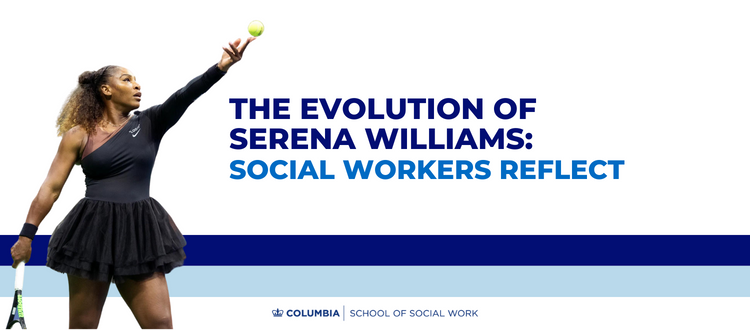Nearing age 41, Serena Williams is leaving professional tennis. Via the September issue of Vogue she announced that she is not retiring but “evolving,” in order to have a second child and continue building her venture capital firm. In a conversation on the Archetypes podcast hosted by Meghan, Duchess of Sussex, Serena revealed her personal and professional challenges, from the demands of playing a match after staying up all night with an injured child to the trauma of lost points and matches due to bad calls from biased officials.
Serena is the Greatest of All Time. She is the most accomplished female tennis player in history, with 23 Grand Slam singles titles, 14 doubles titles, and a 319-week record as the top-ranked player in the Women’s Tennis Association. As Serena played her final US Open, CSSW faculty and alumni who are athletes and who work with athletes shared some insights. These professionals reflect on what Serena’s career has meant to sports and the world at large, and how difficult it can be for an athlete to choose the right time to leave a sport.
Janice Geneva Matthews (PhD ‘87)
Sports counselor, retired Professor of Social Work at Loyola University Chicago
The tennis world—including the match commentators, the producers who compiled video tributes to Serena, and the corporate TV sponsors—has finally acknowledged and embraced the generational, psychosocial, and societal paradigm shift that Serena and Venus Williams have sparked.
More importantly, the media coverage has acknowledged their lasting societal impact. These two tennis players have pursued equal pay for female athletes and opened up spaces where natural hair (such as cornrows adorned with beads) is worn and celebrated. They have challenged narrow and ethnocentric notions about ideal female athletic body types as well as racist and classist beliefs that any sport is inherently reserved for white middle- and upper-middle-class athletes.
Previously, female tennis players were expected to behave in a “ladylike manner”—no grunting, playing aggressively, or hitting the ball hard. The Williams sisters have challenged these rigid gender norms.
Chloe Svolakos (MSW ‘12)
Psychotherapist, athlete
The sports industry and its viewers have unsustainably high expectations for athletes. When athletes miss marks and when they step down entirely, they are expected to explain themselves. This treatment promotes objectification, even if it appears in the name of glory.
Athletes need support in learning how to healthily enjoy their successes, address grieving, and engage in self-discovery. Athletes are whole people, and we must change how we look at them.
Serena Williams’s setting healthy boundaries through language is powerful. Expressing the decision to step away from tennis as more of a transition than a retirement allows for fluidity in her choosing what is most authentic and finding balance. Williams’ mind may change again and again, or not at all, and that is her right. She is reclaiming herself in a world that demands we box ourselves into categories and descriptors for the comfort of others.
Neha Uberoi (MSW ‘20)
Therapist and performance coach, 2022 US Open Player Mental Health Ambassador, former professional tennis player, co-founder of South Asians in Sports
Serena Williams and Venus Williams are cultural icons who have repeatedly broken racial, sexist, maternal, athletic, and financial barriers. Serena unapologetically brought her black American female identity to a white sport and has dominated it for over two decades. Serena is a trailblazer who has had to advocate for herself and others on and off the court battling racism, sexism, and beauty standards time and time again to demand the respect she deserves.
In my work, I’ve found that athletes may struggle during retirement. They may be coping with identity issues, depression, family conflict, adjustment difficulties, occupational dissatisfaction, and financial stress. Athletes tend to believe they should not need external mental health support. However, this is slowly changing, and we need to establish that athletes are a distinct demographic with unique needs that require sports-specific clinicians to best support them. Having more athletes share their struggles publicly can lead to greater access to mental health support and a cultural shift toward using these resources.
Annie Grier
CSSW Adjunct Lecturer, former professional football player, sports talk show host
Serena Williams’s retirement has been coupled with conversation concerning her “mental fitness.” As a former athlete with mental health diagnoses (generalized anxiety disorder and depression), I like that framing and language. The term “fitness” allows me to hold on to the concept of emotional and mental wellbeing and readily points to a pathway to address it.
We must commit to the routine things that build our mental and emotional accounts so that when a significant life event happens, we have a bank of tools and resiliency from which we can draw without being overdrawn. For two decades, Serena has been an exemplar of physical fitness and now, in her retirement, she is modeling how to be a champion in mental fitness.
